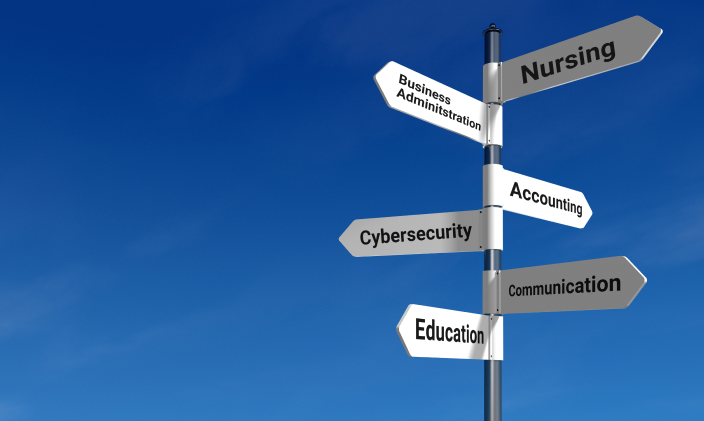
Online Communication Degree
Bachelor of Science in Communication
With a bachelor’s degree in communication, you’ll develop career-relevant speech and writing skills to prepare for a variety of professional roles across diverse organizations. No matter where you work, being able to get your ideas across and convince people to buy products and services can help make you an asset.
Our online communication degree is two-fold. First, you’ll learn the basics of communication covering topics like logical argumentation, rhetoric and storytelling. Then, you’ll delve into the business side of communication and explore focus areas like investigative journalism, public relations, social media and more. Develop career-relevant skills and prepare to be a copywriter, editor, media relations specialist or other communication professional.
Ignite Your Passion
Start when you're ready
Register by:
Courses
Browse courses for your online communication degree
Education should hold practical value. That’s why we built our communication program with input from industry leaders. Our coursework emphasizes theory and application in the areas of corporate, intercultural, interpersonal and organizational communication.
Look for this icon to see which skills you’ll learn in a course.
Bachelor's in communication requirements
You’ll need 120 credits (3 credits per course) to complete this online bachelor’s in communication program. Your course schedule may vary based on transferable credits or credits earned through the University's Prior Learning Assessment.
Our communication courses provide career-relevant skills to teach you how to successfully interact with others in a variety of business-related situations. You’ll practice verbal, nonverbal and written communication skills. Plus, you’ll learn how to use communication software applications, apply active listening and intercultural communication skills, and present information and messages that add value to business decision making.
Popular course topics
In our online communication degree program, you’ll learn about relevant topics in society, including the power of storytelling, the importance of interpersonal strategies and the increasing prominence of diversity and inclusion in the workplace.
Here’s a few ways these topics can help benefit students like you:
- Regardless of industry, employers are looking for professionals who can communicate clearly and effectively, with skills in interpersonal communication, cultural awareness, collaboration, problem solving and negotiation/diplomacy.
- Global businesses utilize a variety of social media, marketing, customer service, intercultural communication and public relations strategies. Our communication courses help you develop career-relevant skills in persuasive communication, storytelling, interpersonal relations, change/conflict management and strategic communication to prepare for jobs in these areas.
- Empathic leadership, organizational communication and corporate communication are key to effective business management and decision making. Contemporary businesses are judged not just on the quality of their products and services, but also by their ethical and social values. Providing opportunities for mentorship, personal connections, team bonding, social responsibility, and personal and professional wellness will be key to keeping new generations of workers actively engaged and productive.
Plan your schedule for an online communication degree
Your academic counselor will help schedule your courses for an online communication degree.
If you’re in Phoenix, the Bachelor of Science in Communication program may be offered as a blended program. This means you’ll start at the Phoenix campus to complete your general education courses, and then transition to online learning for your core program courses.
Our flexible, blended learning format can be beneficial to students who are uncertain about the online learning environment or who want to further develop their technical/computer skills prior to taking courses fully online.
Earn career-relevant skills in weeks – not years.
Learning shouldn’t take years to put into practice. That’s why we’re empowering you to build career-relevant skills with every five- to six-week course.
We’ve worked with the labor market researcher Lightcast to identify in-demand skills for occupations and mapped those to our related associate, bachelor’s and master’s degree programs.
Tuition
Paying for school
Tuition is based on number of credit hours per course. Courses are typically 3 credits, but can range from 1-6 credits. Costs do not include savings opportunities like transfer credits and scholarships.
What affects the overall cost of my program?
Your full program cost can vary by:
- Savings opportunities. Your cost could be reduced with eligible transfer credits, scholarships, employer discounts and more. Students with eligible credits and relevant experience on average saved $11K and 1 year off their undergraduate degree at University of Phoenix.
With our Tuition Guarantee, you pay one flat, affordable rate from the moment you enroll to the day you graduate from your program.
Discover ways to save time and money on your degree with our Savings Explorer® tool:
Other ways to save on time and tuition
Because we believe everyone deserves an affordable education, we work hard to help our students achieve one. Here’s a few ways you can save time, save money and avoid starting from scratch.
Transfer credits
Your prior eligible college credits can lower your cost and help you graduate sooner. As a transfer-friendly university, we accept eligible credits from 5,000+ accredited institutions.
Employer tuition benefits
Are you employed? Check to see if your employer has an alliance agreement with us for education benefits. This can help you save money while gaining skills that could apply to your job.
Credit for life experience
We look at all your relevant experience, from parenting to past jobs, to help you get the college credits you deserve. For every 3 credits earned, shave 5 weeks off your degree.
- View 1
- View 2
- View 3

Budget & borrow
How to pay for college
Paying for school can be intimidating, but we’re here to help you make sense of it. Our finance advisors can walk you through your options like federal financial aid and savings opportunities to minimize your debt. Plus, we can help you figure out your financial plan.
Careers & Outcomes
What can you do with a bachelor's in communication degree?
The Bachelor of Science in Communication prepares you for entry-level employment opportunities that require effective communication skills. You’ll learn how to write press releases, develop sales and marketing communication, review journalism ethics, create an organizational structure plan and more.



7% growth
According to the Bureau of Labor Statistics , job growth for media and communication careers is projected to be as fast as average between 2023 and 2033.
The BLS Projected Growth for 2023-2033 is published by the US Bureau of Labor Statistics. This data reflects the BLS’ projections of national (not local) conditions. These data points are not specific to University of Phoenix students or graduates.
Communication industry spotlight
Effective communication is a key component of business in every industry, including manufacturing, finance, healthcare, marketing, government and education. As a student in the bachelor’s in communication program, you’ll learn key aspects of business and interpersonal communication that will prepare you for work in a variety of industries.
68,000+
The number of new media and communication jobs the market is projected to add over the decade.
$47,020—$105,870[1]
The 25th to 75th percentile wage range estimate for media and communication careers in May 2022.
[1] The salary ranges are not specific to students or graduates of University of Phoenix. Actual outcomes vary based on multiple factors, including prior work experience, geographic location, and other factors specific to the individual. University of Phoenix does not guarantee employment, salary level or career advancement. BLS data is not geographically based.
Admissions
Apply for free – no application fee, no obligation.
Starting your online communication degree is a big decision — and we want you to feel great about it. That’s why we remove obstacles from your application.
- No SAT/ACT required
- No essay required
- We’ll request transcripts at no cost to you, when possible, and we accept eligible credits from over 5,000 accredited institutions.
How to enroll at University of Phoenix

Gabriel G., Enrollment Rep
Receive 1-on-1 support
You have a support team of real people you can lean on. And our academic counselors, who are with you every step of the way, have earned a 5-star rating from 85% of our surveyed students.[1]
[1] Transactional Survey, September 2022-August 2023 (23,739 respondents)
Start a conversation with an enrollment representative today.
Call us at 844-937-8679 or chat with us 7 days a week.
Receive 1-on-1 support
You have a support team of real people you can lean on. And our academic counselors, who are with you every step of the way, have earned a 5-star rating from 90% of our surveyed students.[1] Start a conversation with an enrollment representative today.
[1] Transactional Survey, August 2021-22 (18,645 respondents)

Call or chat with us 7 days a week.
Communication Student Experience
Online learning
Our communication courses are offered in a five-week, asynchronous online format to give you the flexibility and time needed to work and raise a family while also going to school.
Mimic real-world, on-the-job tasks
You’ll learn, practice and apply your effective communication skills to real-world scenarios like writing a press release, developing a public relations crisis plan and drafting social media posts.
Around-the-clock support and resourcess
You have a support team available up to 14 hours a day, 5 days a week.

Faculty Spotlight
Communication professionals dedicated to you
Your success is a top priority for our faculty members, who bring an average of 28+ years of professional experience to the classroom. Our faculty lead in the fields they teach and leverage their real-world experience as editors, technical writers and more. This helps bridge the gap between academics and industry knowledge.
Your communication faculty undergo a rigorous mentoring and training program to ensure a quality education. We also keep our student-faculty ratios low, so our communication faculty can engage in class discussions, provide productive feedback, respond quickly and provide personal attention when needed.
Accreditation
Accredited for 45+ years
Since 1978, University of Phoenix has maintained institutional accreditation by the Higher Learning Commission (HLC), hlcommission.org . Learn more about the value of University of Phoenix accreditation and how it benefits our students.
Communication degree articles
Frequently asked questions about our online communication degree
*While widely available, not all programs are available to residents of all states. Please check with a University Enrollment Representative.





